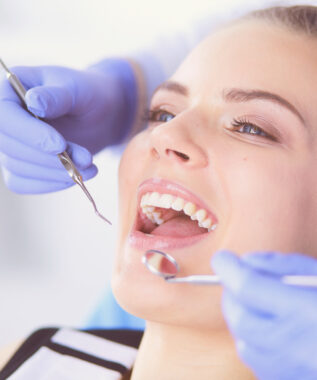 Grinding your teeth is a complicated phenomenon, especially in its early stages. First, you must monitor it and make sure that it is not a chronic concern as opposed to a one-off experience. Moreover, many people might not even be aware that they are affected in the earlier stages, as it occurs when a person is unconscious in slumber. Still, it is important to do what you can to monitor any teeth grinding that occurs and seek appropriate treatment before it gets worse. In today’s blog, your Leawood, KS dentist furthers this discussion by examining the effects of TMJ disorder and describes how it can arise from untreated teeth grinding.
Grinding your teeth is a complicated phenomenon, especially in its early stages. First, you must monitor it and make sure that it is not a chronic concern as opposed to a one-off experience. Moreover, many people might not even be aware that they are affected in the earlier stages, as it occurs when a person is unconscious in slumber. Still, it is important to do what you can to monitor any teeth grinding that occurs and seek appropriate treatment before it gets worse. In today’s blog, your Leawood, KS dentist furthers this discussion by examining the effects of TMJ disorder and describes how it can arise from untreated teeth grinding.
What Are Your TMJs?
Taking care of your smile is a lifelong endeavor. Not only does it require you to learn effective preventive dental strategies early on, but to maintain these practices consistently throughout the course of your life. Although we are equipped to tackle the most common of issues – like tooth decay and gum disease – it is important to recognize that these are not the only concerns that we have to worry about.
As we previously discussed, grinding your teeth can lead to a host of complications, including wearing down your surfaces, increasing chances of developing an infection or cracking a tooth, and more. In addition to these, untreated bruxism can lead to a dangerous jaw dysfunction known as TMJ disorder.
Your temporomandibular joints (TMJs) are the two primary points at which your lower jaw hinges to your cranium. In other words, they are responsible for allowing your jaw to move in the way it does for routine tasks such as biting, chewing, and eating. By moving your jaw from side to side during bruxism, you run the risk of your jaw becoming misaligned with one or both of these joints.
Incessant Popping and Clicking
When you experience TMJ disorder, one of the most notable signs will come in the form of an incessant popping or clicking sensation in the jaw. You will not only hear this, but feel it as well. In some cases, it can cause mild discomfort, whereas others may lead to significant pain.
In the worst of situations, TMJ disorder will cause damage to your sensitive tissues and difficulty opening the mouth appropriately for routine tasks. To learn more about this phenomenon and what your treatment options are, give us a call today.
Ways We Can Help
Though bruxism and TMJ are certainly not issues to take lightly, all hope is not lost. In fact, our team offers both custom oral appliances and guided splint therapy to help alleviate any discomfort or pain and gradually guide the jawbone back into place.
Learn More Today
Contact Dreem Dentistry in Leawood, KS by calling 913-681-5500 to schedule your next appointment with our team and learn more about the different ways we can help you treat any bruxism or TMJ disorder concerns.






